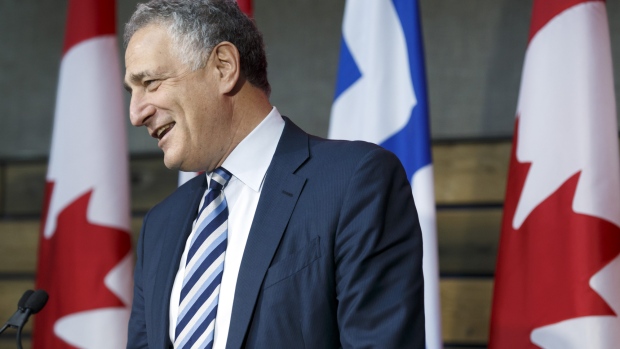Mar 13, 2019
Alphabet looks to New York's Hudson Yards bond model for Toronto waterfront
, Bloomberg News

The urban innovation unit of Alphabet Inc. may take a page from the Hudson Yards development in New York to help finance a futuristic urban hub on 800 acres of derelict land along Toronto’s waterfront.
Sidewalk Labs LLC, sister company to Google, is exploring financing options that could include the sale of bonds backed by tax revenue and development charges from the commercial site along the shores of Lake Ontario, Chief Executive Officer Dan Doctoroff said.
The financing model could mimic the plan used to finance part of the US$25 billion Hudson Yards complex, which Doctoroff first envisioned in 1996 and helped get off the ground after he became deputy mayor of New York in 2002. Investors ended up funding about US$3 billion worth of special-purpose Hudson Yards Infrastructure Corp. bonds that went to the development of the No. 7 subway line and other infrastructure, he said.
The New York subway extension helped link central Manhattan to the Hudson Yards, a former industrial area that had been barren for decades. Hudson Yards, which is set for the grand opening of its retail and public spaces on March 15, has become the largest private development project in U.S. history, with some of the most expensive real estate in New York City.
Backstop Financing
“We devised this approach, which said, we’ll go to bondholders and get them to put up the money on the hope that there would be development in the area,” Doctoroff said in an interview from Bloomberg’s Toronto office. “We will devote all of those incremental tax revenues and some other related revenue streams to the payment of debt service on the bond.”
Doctoroff sees the same need for a light-rail link to the Toronto development, which sits about 1.5 kilometers (0.9 miles) from the financial core of Canada’s biggest city. The bonds would be issued by a special purpose corporation, not necessarily Sidewalk, he said.
Alphabet could also provide a backstop to the project before bonds are sold and investment starts rolling in. As part of the plan, the firm is also mulling a proposal to take a cut of property taxes, development charges and increased land values in the project which it estimates could generate about $6 billion over the next 30 years.
Patient Capital
Having a private company potentially get a cut of taxes has spurred considerable debate in the city, along with concerns over privacy issues surrounding data gathered from the project. Sidewalk has proposed a civic data trust be created to own and manage data generated in public spaces.
“We’re prepared to help facilitate it. We do have to get paid back with at least a reasonable return,” Doctoroff said. “One way of actually doing that is for us to essentially front the money or potentially provide some kind of guarantee for it whereby we or others only get paid back out of the incremental revenues -- generally tax or development charges.”
Those revenues wouldn’t have existed but for the investment infrastructure, he said.
The financing model could allow the waterfront rail link to be built by as early as 2025, about 20 years sooner than otherwise, he said, estimating total cost of transit to be about $1 billion. “If you don’t have mass transit, let alone other infrastructure going into that site, it will never develop," he said.
Doctoroff said it helps having the backing of Google parent Alphabet to push the project along. “We do have the benefit of our parents, which is very patient capital,” he said. “They’re willing to use it in creative ways to help get things done."
Preliminary Conversations
Sidewalk plans to submit an official proposal in the next three months or so to the project’s key stakeholders, which include Alphabet, Waterfront Toronto, and various levels of government. The plan includes first revitalizing a 12-acre neighborhood, dubbed Quayside, which would include a new Google campus and become a mecca of green energy, sustainable technology and mixed-income housing units. In the best case scenario, construction could begin at the end of next year, he said.
The firm has held some "very preliminary" conversations on financing with several pension funds across Canada and is working with a number of investment banks, Doctoroff said, adding it was too early to name potential advisers or partners.
Doctoroff was CEO of Bloomberg LP and deputy mayor of New York City under Michael Bloomberg, Bloomberg’s founder.







